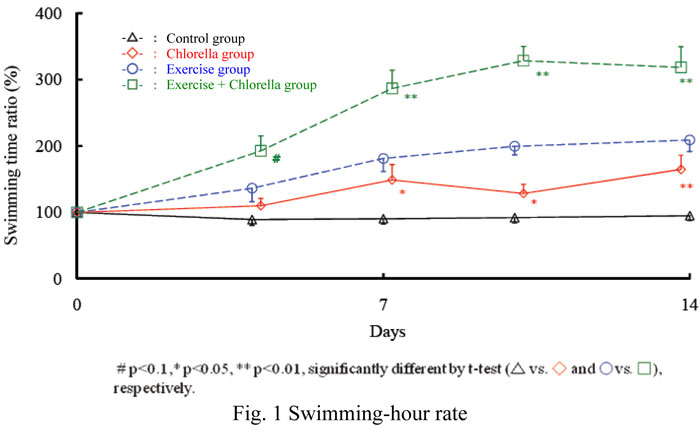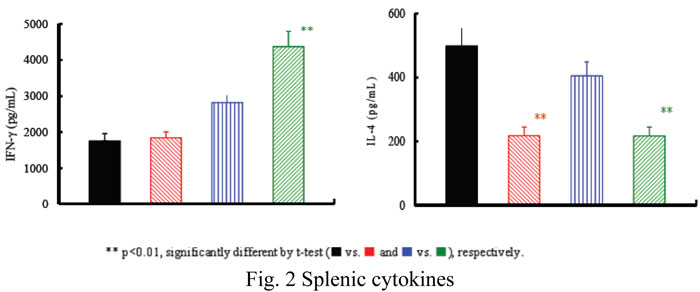- TOP
- List of reports
- Combination of Chlorella Consumption and Light Exercise Prevents Deterioration
of Physical Strength and Immunity Due to Aging
Combination of Chlorella Consumption and Light Exercise Prevents Deterioration of Physical Strength and Immunity Due to Aging
【Scientific information】
Research and Development Department, Sun Chlorella Corporation

Combination of Chlorella Consumption and Light Exercise Prevents Deterioration of Physical Strength and Immunity Due to Aging
Presented at the 10th General Meeting of the Japanese Society of Anti-Aging Medicine (2010)
- Study Objectives
- It is known that physical strength and immunity deteriorate with age and that exercise can prevent such deterioration. On the other hand, an anti-fatigue effect and prevention of immunity have been reported for Chlorella (http://www.3960.sc/images/pdf/21.pdf, http://www.sunchlorella.co.jp/pdf/09.05.25kennkyuu-repo.pdf). We therefore examined the effects of prolonged Chlorella consumption with exercise.
- Method of experiments
- Thirty-nine male BALB/C mice aged 17 weeks were used in the study. The mice were divided into 4 groups: a control group (normal cage + normal food), Chlorella group (normal cage + Chlorella food), exercise group (exercise cage + normal food), and exercise + Chlorella group (exercise cage + Chlorella food). Chlorella food was prepared by mixing 2% Chlorella powder with the normal food AIN93G and accessed freely. The animals in the groups with exercise cages were housed in special cages provided with a climbing tower (50 cm in height) made of stainless steel wire net with food supplied on top of the tower so that light resistance exercise was performed routinely and voluntarily. Blood sampling and organ weight measurement (liver and skeletal muscles in the hind legs) were performed at 58 weeks after the start of administration to determine blood glucose, triglyceride, free fatty acid, and total cholesterol levels in blood and IFN-γ and IL-4 levels in the spleen using an ELISA kit. RNA was extracted from the skeletal muscles in the hind legs, and comprehensive gene expression analysis was performed by DNA microarray. The mice were forced to swim 5 times starting from 14 days before the last day of the study (swimming on Days 0, 3, 7, 10 and 14) and the swimming-hour rate was calculated.
- Results
- The swimming-hour rate was significantly higher in the Chlorella groups on Days 7, 10, and 14 of swimming (p<0.05, p<0.05 and p<0.01, respectively) than in the control group. It was significantly higher in the exercise + Chlorella group on Days 3, 7, 10, and 14 (all p<0.01) than in the exercise group (Fig. 1). Moreover, in the exercise + Chlorella group, IL-4 level was significantly lower (p<0.05 and p<0.01, respectively) and IFN-γ significantly higher (p<0.01) than in the exercise group (Fig. 2). The results of gene expression analysis showed significant changes in immune-related genes in the groups that ingested Chlorella.
- The above results demonstrated that 58-week Chlorella consumption prolonged the swimming-hour rate and prevented changes in IFN-γ and IL-4 levels due to aging and fatigue. It was also found that these effects were enhanced by light resistance exercise practiced routinely. We therefore concluded that consumption of Chlorella could prevent deterioration of physical strength and immunity due to aging and that combination of it with exercise can enhance these effects.


Presentation at a scientific meeting
- Name of meeting:
- The 10th General Meeting of the Japanese Society of Anti-Aging Medicine (2010)
- Title:
- Anti-fatigue effects of long-term consumption of Chlorella and voluntary exercise in senile mice
- Presenters:
- Yukari Arakawa, Masaki Fujishima, and Toru Mizoguchi
- Affiliation:
- Sun Chlorella Corporation





